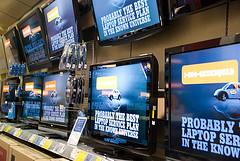Is Showrooming Rude Or Just Part Of Doing Business? Image courtesy of (Kevin McShane)
Smart shoppers compare prices before they buy anything; this is nothing new. But is there a difference between comparison shopping at retail stores and “showrooming,” where you check out a product at a store and then buy it from an online retailer?
After all, is there any net difference to Store A if the customer ends up buying the product at Store B or StoreXYZ.com? Store A didn’t make the sale and some other retailer did. But some businesses seem to be particularly offended if the sale goes to a website and not a store down the street.
Time & Effort
One of the more common complaints from retailers is that they put in all the time and effort into displaying and marketing a product, only to have the sale go to a dotcom business. Which may be a valid point. If I’m a store owner and I buy ads and do publicity to get people in my store, it’s going to sting when they just pull out their phone and buy it online.
However, it still eludes us how this is, ultimately, any different than if the customer went and bought the item at a different retail location. Just because a store invests in marketing a product doesn’t mean it has the best deal on the item — or good customer service.
It could also be argued that online retailers are doing some of the work to get customers in that store. It’s possible, and will become increasingly likely, that the customer has been checking out products online and is going to the store with the purpose of checking it out in person, as opposed to being drawn in by the store’s marketing efforts.
No Sales Tax
This has been, and continues to be in several states, a regular gripe held by retailers: That customers shop at Amazon because they don’t have to pay sales tax.
Technically this isn’t true (unless you live in a state with no sales taxes), as customers are supposed to paying the taxes to the state when they file their return every year. Most people don’t; thus the claim of “no sales taxes.”
It’s a very valid complaint, especially on expensive electronics, where sales tax could easily add up to $50, $75 or more for a single item.
It’s also a complaint with almost no legitimate analogy to the bricks-and-mortar world. Yes, a consumer in Philadelphia can drive to Delaware to enjoy tax-free shopping, but most of the country does not have that option. And even those that do need to factor in the cost of fuel, tolls, and travel time before deciding whether it’s worth the effort.
Amazon has just begun collecting sales taxes in many states like California, Texas, and Pennsylvania, so it will still be a while before one can accurately say whether this has helped level the playing field.
It’s Just Rude
This may be the argument that is both the least money-related and the easiest to understand.
“Anyone under 30, you can spend 45 minutes fitting them into a pair of jeans, they’ll write down all the info and say thank you and go buy it online,” the owner of an Ohio fashion boutique explains to the Cleveland Plain-Dealer about having to deal with showroomers. “It’s not something that occurs to them, that it’s rude… They’ll take a picture of the tag right in front of you.”
This store owner’s statement may get to the heart of the matter. There is something inherently impolite about making your purchase right in front of the person who has just spent their time trying to provide you a service. It’s like setting up a date while you’re already in the middle of a romantic night with someone else.
There is also no need for such behavior. If you can trek all the way to a store and have someone help you, it’s not going to kill you to wait until you’re in the parking lot; or at least you’ve allowed the employee to move on to another customer.
Much like when big box stores came onto the scene and began to lure customers away from local businesses with the promise of lower prices and one-stop shopping, there are going to be years of growing pains as bricks-and-mortar stores (which encompasses retailers of all size) figure out what their place is in a world where you can buy just about anything from the comfort of your own phone.
Perhaps stores will begin catering directly to showroomers. An electronics retailer — especially one the size of Best Buy — could have demo models for products that are available at a deep discount only at the company’s website. Or a retailer could offer add-on services that online retailers can’t; so maybe you buy your new computer online but you buy an extended warranty (not that we’d ever recommend that) from the retailer.
All we ask is that while these things sort themselves out, people continue to treat each other politely… or at least refrain from physical violence.
Want more consumer news? Visit our parent organization, Consumer Reports, for the latest on scams, recalls, and other consumer issues.


